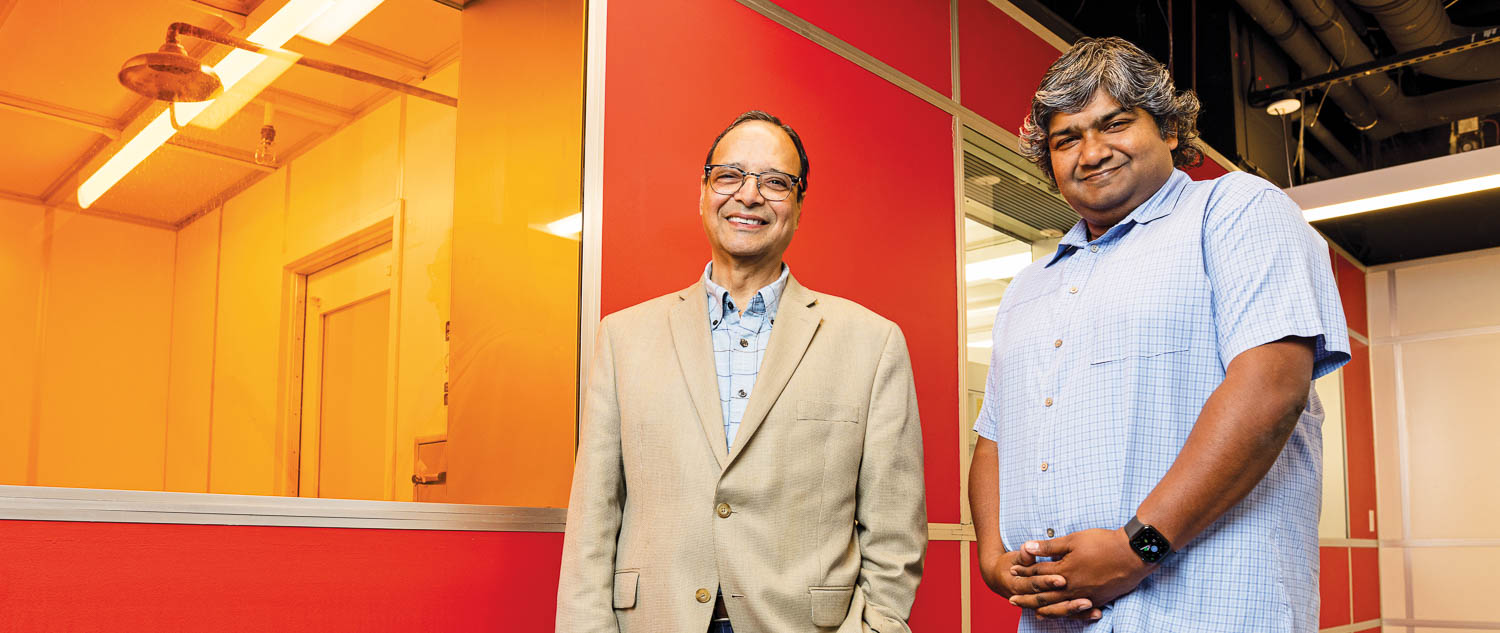- By Tracey L. Regan
By deepening its research capabilities, NJIT is finding new ways to immerse undergraduates in Ph.D.-level scholarship while simultaneously increasing the number of underrepresented students it serves.
Creative initiatives will also advance the commercialization of promising faculty inventions and forge alliances with other research powerhouses in the region to take on large-scale societal problems.
A University First
A multidisciplinary team of biomedical engineers, chemists and biologists recently secured $5.8 million from the National Institutes of Health to fund a biomedical research program designed to propel undergraduates into high-powered scientific careers focused on health care. The NIH training grant, the university’s first, will provide nine sophomores – three per year for the next three years – with full tuition and stipends, individual mentoring and career development experiences as they conduct high-level research, including writing a thesis, in preparation for top Ph.D. programs. One of the initiative’s goals is to diversify the scientific workforce by recruiting talented students from underserved communities.
The grant builds on the university’s Undergraduate Research and Innovation program by “creating a bigger structure around their research and a new level of expectations,” explained Bryan Pfister, chair of the Department of Biomedical Engineering and the grant’s principal investigator. At a spring open house, potential participants quizzed faculty and advanced student researchers about their ongoing projects. Later in the semester, a first cohort of 21 faculty members took part in a required mentor training workshop.
“It’s a win-win for faculty and students. Faculty will have access to students with better training, and when they see higher productivity levels, they will be more interested in working with student researchers. We’re upping our game,” Pfister said. “We’re also hoping that much of what we learn here can be disseminated across the campus.”
Innovating Toward the Marketplace
To accelerate the development and marketing of faculty and student inventions, NJIT last year established a seed grant program that drills down on the potential commercial benefits of university research at earlier stages of the translation and market validation process. These Technology Innovation Translation and Acceleration (TITA) grants provide up to $75,000 per project over three phases, as well as guidance and feedback from an industrial advisory board.
So far, four projects have been awarded phase one grants. In May, the group heads reported on their progress in building their prototypes for market evaluation and validation. In the next phase, they will collect user feedback and testing data to revise them, and in the third stage, develop technology commercialization and business development plans as they seek private investment funding and federal innovation partnerships grants to commercialize them.
Sagnik Basuray, an associate professor of chemical engineering, for example, is developing a modular, point-of-care microfluidic device capable of quickly detecting multiple animal-borne diseases, including infectious diseases that can be transmitted between animals and humans. In a recent presentation to TITA’s advisory board, he noted that 75% of emerging pathogens originate in animals. “If we can measure them in the field easily, quickly and inexpensively, we can prevent spillovers,”
he said.
Salam Daher, an assistant professor of informatics, is working on a system that accurately simulates, measures, tracks and analyzes irregularly shaped wounds in 3D. “Healthcare providers are still using rulers and Q-tips to measure wounds,” she noted. “We use simulation and 3D graphics technology to track measurements and the progression of healing.”
New Collaborations
Finally, the spring 2023 meeting of the NJIT chapter of the National Academy of Inventors drew together for the first time the heads of research and innovation programs at eight universities in the metro region, including Princeton, Columbia and Rutgers, among others, to discuss the benefits of collaboration. The next step is to meet at Princeton and Rutgers to discuss core research resources for faculty to access for collaborative research.
“Collaborative research is the key to securing large research and innovation partnership-based grants that will allow us to combine our skills to tackle multifaceted, related problems such as climate change and resilient infrastructure, for example,” said Atam Dhawan, NJIT’s interim provost and senior vice provost for research.

From left: Atam Dhawan, senior vice provost for Research, executive director of Undergraduate Research and Innovation (URI) and distinguished professor of Electrical & Computer Engineering with (right) Sagnik Basuray, associate professor in the Department of Chemical, Biological and Pharmaceutical Engineering in the Newark College of Engineering.
